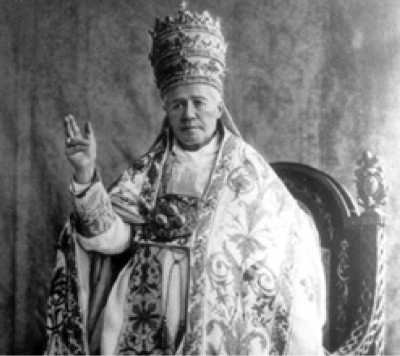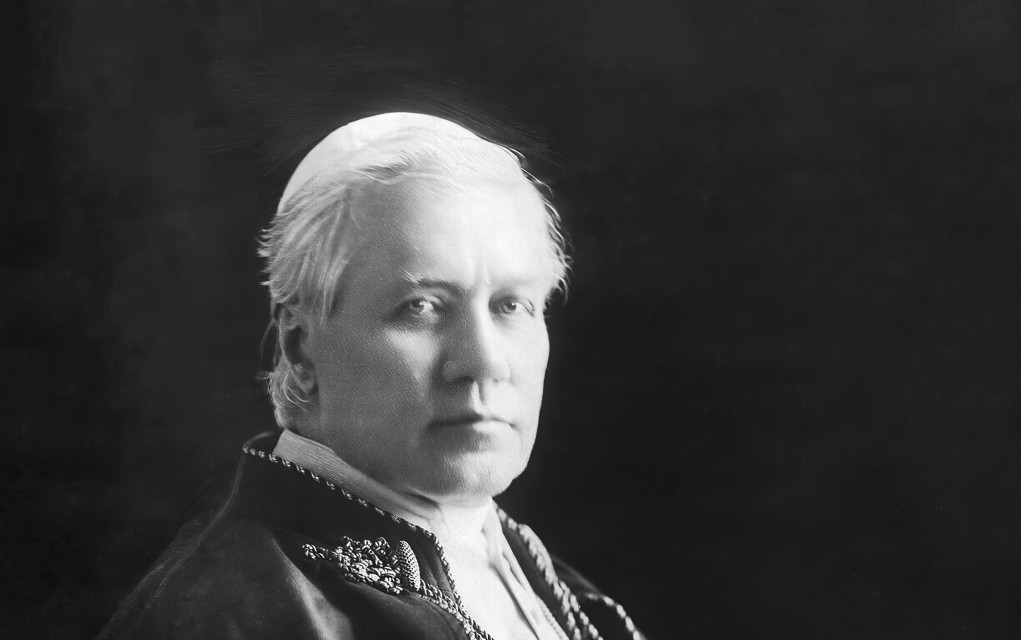1835-1914
Feast day: Aug. 21
As pope from 1903 until his death, St. Pius X endeavored “to restore all things in Christ,” which was his papal motto. This meant that his papacy was a time of ecclesial renewal and reform in which he labored to bolster the faith of Catholics. He condemned modernism, prioritized strong catechetical instruction, initiated the codification of canon law and enacted various liturgical reforms.
One of the hallmarks of Pius’ pontificate was to increase fervor for the Eucharist. His program of Eucharistic fervor emphasized the regular, pious reception of the Eucharist, whereby, he said, “union with Christ is strengthened, the spiritual life more abundantly sustained, the soul more richly endowed with virtues and the pledge of everlasting happiness more securely bestowed on the recipient.” Likewise, he encouraged the reception of first holy Communion at the age of reason, or about 7 years of age, abandoning the centuries’ old practice of reserving first reception of the sacrament for older children and young adults. He hoped to leave a powerful impression on the young child’s mind and also encourage their parents to more faithful observances.
“[In the Eucharist,] union with Christ is strengthened, the spiritual life more abundantly sustained, the soul more richly endowed with virtues and the pledge of everlasting happiness more securely bestowed on the recipient.”
— Pope St. Pius X
Pius X’s life began as Guiseppe Sarto in the northern Veneto region of modern-day Italy, one of 10 children. His father was a mail carrier, and Pius X grew up in a family of simple means, which was a source of humiliation for him at times. Even as a young boy, though, he made attending daily Mass a priority, despite having to walk several miles back and forth to school each day. At 15, he received a scholarship to continue studies in pursuit of ordination to the priesthood, which he received in 1858 at the hands of then-diocesan bishop St. Giovanni Farina.

Public domain
The young priest excelled in scholarly pursuits and was pastorally attentive to the poor and sick. In the 1870s, he put his own health at risk by tending to the sacramental needs of victims who suffered from a cholera epidemic. Before long, he earned a reputation for personal holiness. He rose to prominence as a trusted collaborator of bishops, taking on various curial positions. Despite his prominent positions, Pius remained committed to practical pastoral work. He also taught in seminaries at different times, serving in the role when he was named a bishop in 1884. Visiting his mother after his ordination to the episcopacy, she reportedly said, after kissing the ring signifying his new office: “But you would not have this fine ring, son, if I did not have this,” pointing to her own wedding band.
Pius served as bishop of Mantua in central northern Italy for just under a decade before his appointment as patriarch of Venice. His papal predecessor, Leo XIII, created him a member of the college of cardinals in 1893 . A decade later, he would succeed Leo as pope, when Pius was elected Aug. 4, 1903.
As pope, Pius was as diligent in conserving the deposit of faith Christ gave the Church as he remained close to his flock. His audiences often saw him engaging young children, who sat at his feet and could talk to the pope about anything they wanted. He also ensured proper catechetical instruction at parishes throughout the world, resulting in a popular catechism that taught the Faith in concise and approachable language. In 1908 , after a major earthquake in southern Italy killed nearly 80,000 people — the most destructive recorded in European history — Pius filled the apostolic palace with refugees.
Suffering from a heart attack the previous year, Pius died on Aug. 20, 1914 , at the Vatican. His last year was spent in declining health, worsened by the outbreak of World War I. Heralded as a saint by the Italian press upon his death, his canonization came only 40 years later in 1954 . An epitaph on his original tomb described him as “poor and yet rich, gentle and humble of heart, unconquerable champion of the Catholic faith, whose constant endeavor it was to renew all things in Christ.”
Michael R. Heinlein is editor of OSV’s Simply Catholic. He writes from Indiana. Taken from the “Inspired by the Eucharist” saint booklet.

